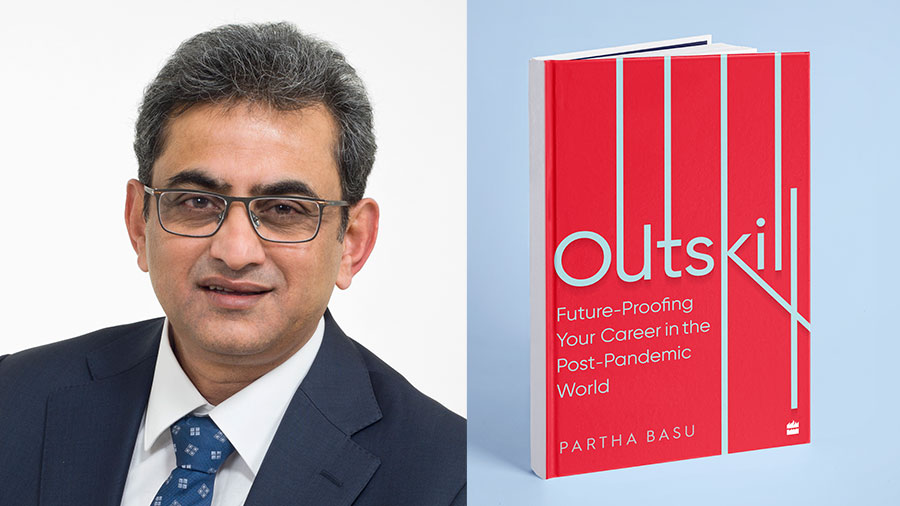Partha Basu has worked in leadership positions at Coca-Cola, Whirlpool, IFB group, Tata Group, Spicejet and AkzoNobel. A die-hard Calcuttan, he now lives in Amsterdam. While his writings are mostly based on his travel and life experience, his latest book seeks to address the struggles of a workforce grappling with the challenges of a post-pandemic world.
In his introduction to the book, Partha Basu tells his readers what led him to write the book and why he titled it Outskill:
The pandemic arrived, pressing pause on existence around the globe, redefining life as we know it. We were unsure what business-as-usual will look like after this is over. But the unprecedented global crisis aside, many of the changes we see now were already creeping up on us. COVID-19 may have simply sped up their adoption.
In the past few years, I have come across many articles and books that talk about how the world will change due to fast-evolving technology. Every other day, I read about how many of us will lose our jobs due to such changes in the world; how the activities that are rewarding today will cease to exist over time.
Enough has been written on this subject. This book is not about that.
But when I read those articles and studies, one of the conclusions I came to was that the way we engage and work in the years to come will be very different from how we do so today.
Three things leapt out at me:
1. Technology will lead the way.
2. Virtual working will be on the rise.
3. The workforce of tomorrow will be looking for flexibility, purpose and authenticity versus selling time to earn a mere salary.
And then, I asked myself:
1. Do I have the skills required in this changing world?
2. Will I survive in this fast-changing world?
3. Will my team be valued for the skills they have today, or do they need something else?
4. How do we prepare the next generation for a workplace that we haven’t even begun to imagine?
And thus the big question is: if the biggest changes are happening, all thanks to technology and the evolving ways of working in a purpose-driven world, what can we do to ensure that we stay relevant in the years to come?
I decided to explore my unanswered questions by speaking to senior leaders in various industries. I spoke to about forty- five leaders and tried to cover varied industries to get a wider view from those who, I believe, are facing these challenges every day, and adapting themselves and guiding their teams to adapt. I wanted to hear from the ‘ground’.
Thus, this book is not only the product of my own research and views, but contains the experiences and wisdom of leaders across industries.
The verdict is clear: there is no time to wait. We need to outskill and be ready to fit into the post-pandemic technology-driven world. We need to adapt and learn new skills or else the road ahead will be tough. Panic won’t help, rather it is imperative that we deal with our emotions, take stock and equip ourselves to adapt and evolve.
And as I could not find a relevant book on this topic, I created one.
This book will tell you how to inculcate and internalize the qualities you need in the virtual, digital world to help you distinguish yourself as a leader in this changeable yet exciting landscape. There are qualities, skills and habits you can develop to ensure that you remain relevant and effective, no matter what the challenges ahead.

‘We need to outskill and be ready to fit into the post-pandemic technology-driven world. We need to adapt and learn new skills or else the road ahead will be tough,’ author Partha Basu tells his readers
Here’s an excerpt from Chapter 10: Psychological Safety
It may sound judgmental, but many people do believe that the traditional corporate environment is a rat race to beat co-workers to the top. Some even believe that it’s dangerous to be yourself and one needs to mimic certain behaviours and display certain traits to survive there.
I won’t go there, but what I find is in our changing world, the future will be a lot about leading a team that thrives in a safe, inclusive environment and can discuss and contribute openly without the fear of being shot down.
There have been studies about this topic, and it has been observed that a team whose members feel psychologically safe around each other often becomes a high-performing team. In the new, fast-changing, technologically driven world, innovations are at the centre of any business, and we need everyone to contribute and lead, not only be led. And such a culture can be promoted only if the team feels valued and psychologically safe.
One of the important aspects of psychological safety is that it is not about the individual winning or losing, it is about winning as a team that matters in the end. It takes continuous effort for a leader to instil this clarity in a team. A leader needs to create an atmosphere where every member participates without judgement, or fear of being judged, is willing to take risks even at the cost of failure, to voice their opinions openly and not feel insecure at any point of time. This also means that every member of the team needs to be honest with each other and should have the ability to admit their mistakes.

‘One of the important aspects of psychological safety is that it is not about the individual winning or losing, it is about winning as a team that matters in the end’
ShutterstockI often wonder how we can measure psychological safety. I am not sure if we can or should convert it into metrics. If the kind of feeling and atmosphere we are aiming for truly exists, the success of the team will tell us we have achieved our goal, so I wouldn’t be too concerned about how to formally measure it.
Through 2020 and 2021, I have been observing different teams’ effectiveness as they have started working remotely due to the COVID-19 situation. One of my favourite leaders is Shirley Johnson, whom I have known for many years. Shirley leads a large team based in London. We were colleagues years ago, and we still talk often and share our thoughts with each other.
During one of our evening chats, I asked Shirley how she was dealing with the situation, with people feeling much more vulnerable due to the pandemic, being locked down and working from home. I was sure the teams must miss the face-to-face interactions with and support of their leaders.
Instead of answering, Shirley asked me a question instead. ‘Where do you feel the safest?’
‘At home,’ I replied.
‘That would be my answer too. Why do you think you are safest at home?’
‘I trust my family members, I can be myself, I can share my thoughts without being judged, and my family is willing to support me if I am going through a bad patch.’
‘We all spend more time at work than in our homes, is it not?’ asked Shirley. ‘So why should our work life be any different? Shouldn’t we feel equally safe at our workplace?’
Shirley said that for her team, nothing had changed due to the pandemic, that it was business as usual. A team that is well-knit stays together, she said, with every member fully trusting the others with a minimum of politics. She had set a few boundaries and agreed on values — such as no one is allowed to talk behind anyone’s back, every idea needs to be listened to, opinions are to be respected and debated before decisions are taken — and she had ensured that the team followed them.

A team that is well-knit, stays together
ShutterstockIn the past two years, the attrition in Shirley’s team has been less than 5 per cent, and she believes that this has been possible only because every member feels safe and valued. Shirley said that everyone in the team behaves as though they are an entrepreneur, coming out with new ideas, sharing thoughts openly even though they might be deemed ‘stupid’. As a leader, Shirley says her main job is to ensure the team has a shared vision and values, operates within the rules of the organization and has established boundaries, and that is what drives her success as a leader.
There are a few important lessons the new-age leader can learn from Shirley to promote a psychologically safe team.
Agree on team values
To build a safe environment, as a leader, you need to agree on the values the team will stand on and remind the team of these periodically. So, first spend time defining these values, which will later help to call out inappropriate behaviours that could damage the psychological safety of the team.
Be yourself
As a leader, you need to create the confidence that each team member can be themselves within the team, that no one needs to pretend, and that they will be accepted as they are. This means they can be free to share ideas and challenge each other’s thoughts without being afraid of being judged.
Conflict is okay
In the corporate world, conflict is often seen as negative; however, I see conflict in a different light. If the conflict is not due to a personal win or loss or to satisfy one’s ego, it can be healthy. The team needs to be mature enough to deal with positive conflict in a manner that will enhance the performance of the team.
Excerpted with permission from HarperCollins India.








